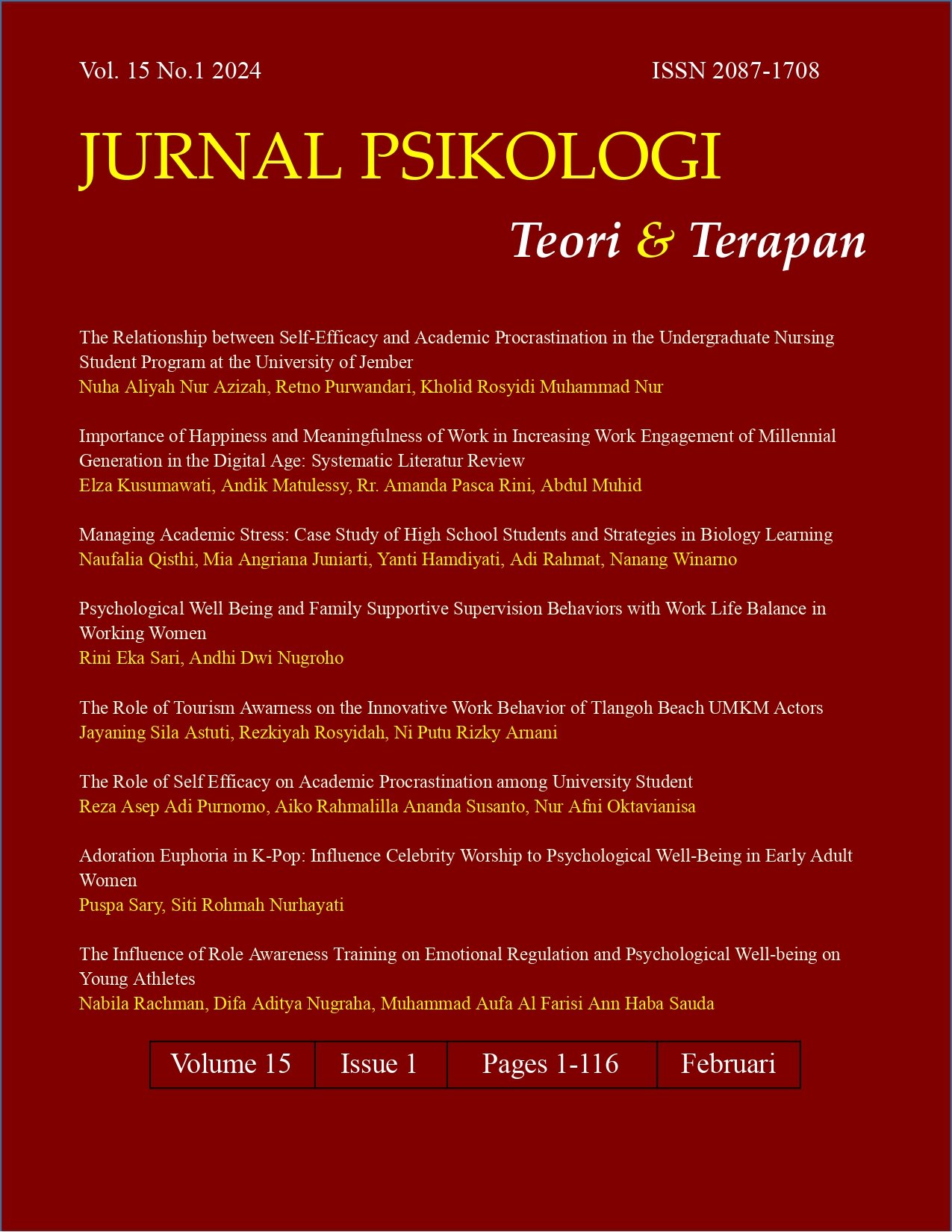The Relationship between Self-Efficacy and Academic Procrastination in the Undergraduate Nursing Student Program at the University of Jember
DOI:
https://doi.org/10.26740/jptt.v15n01.p1-15Keywords:
Academic procrastination, Self-efficacy, Nursing students, Prokrastinasi akademik, Efikasi diri, Mahasiswa keperawatanAbstract
Abstract
Background: Academic procrastination or delays in the academic field are caused by low self- efficacy wich results in a person’s inability to complete assignments. Objective: The purpose of this study was to investigate the connection between nursing students' academic procrastination and self-efficacy. Method: This study utilized observational scientific plan with a cross sectional methodology. The proportionate stratified random sampling method was used for each class to select the 229 students who participated in this study as respondents.Questionnaire General Self Efficacy Scale (GSES) was used to measure self-efficacy, while Procrastination Assessment Student Scale (PASS) to measure academic procrastination in students. With a significance level of 0.05, the spearman-rank correlation test was used to analyze the data. Results : The findings revealed a p-value of 0,073. This demonstrates that nursing students at Jember University have no significant relationship between academic procrastination and self-efficacy. Conclusion : Further research is needed on other factors that can lead to academic procrastination behavior such as peers, the environment, and differences in views on assignments
Abstrak
Latar Balakang :Prokrastinasi akademik atau keterlambatan dalam bidang akademik disebabkan oleh rendahnya self efficacy yang mengakibatkan ketidakmampuan seseorang dalam menyelesaikan tugas. Tujuan : Tujuan dari penelitian ini adalah untuk menyelidiki hubungan antara prokrastinasi akademik mahasiswa keperawatan dan self-efficacy. Metode: Penelitian ini menggunakan rancangan ilmiah observasional dengan metodologi cross sectional. Metode proportional stratified random sampling digunakan untuk setiap kelas untuk memilih 229 siswa yang berpartisipasi dalam penelitian ini sebagai responden. Kuesioner General Self Efficacy Scale (GSES) digunakan untuk mengukur self-efficacy, sedangkan Procrastination Assessment Student Scale (PASS) untuk mengukur penundaan akademik pada siswa. Dengan tingkat signifikansi 0,05, uji korelasi rank spearman digunakan untuk menganalisis data. Hasil : Temuan mengungkapkan p-nilai 0,073. Hal ini menunjukkan bahwa mahasiswa keperawatan di Universitas Jember tidak memiliki hubungan yang signifikan antara prokrastinasi akademik dengan efikasi diri. Simpulan : Diperlukan penelitian lebih lanjut mengenai faktor lain yang dapat menyebabkan perilaku prokrastinasi akademik seperti teman sebaya, lingkungan, dan perbedaan pandangan terhadap tugas.
References
Jahring, J., Nasruddin, N., Marniati, M., & Tahir, T. (2021). Efikasi Diri Mahasiswa Pada Perkuliahan Persamaan Differensial. EDU-MAT: Jurnal Pendidikan Matematika, 9(2), 199. https://doi.org/10.20527/edumat.v9i2.10104
Khoirunnisa, R. N., Jannah, M., Dewi, D. K., & Satiningsih, S. (2021). Prokrastinasi Akademik Mahasiswa Tingkat Akhir pada Masa Pandemi COVID-19. Jurnal Psikologi Teori Dan Terapan, 11(3), 278. https://doi.org/10.26740/jptt.v11n3.p278-292
Lianto, L. (2019). Self-Efficacy: A Brief Literature Review. Jurnal Manajemen Motivasi, 15(2), 55. https://doi.org/10.29406/jmm.v15i2.1409
Lubis, I. S. L. (2018). Hubungan Regulasi Diri dalam Belajar dan Efikasi Diri dengan Prokrastinasi Akademik Mahasiswa. Jurnal Diversita, 4(2), 90. https://doi.org/10.31289/diversita.v4i2.1884
Muyana, S. (2018). Prokrastinasi akademik dikalangan mahasiswa program studi bimbingan dan konseling. Counsellia: Jurnal Bimbingan Dan Konseling, 8(1), 45. https://doi.org/10.25273/counsellia.v8i1.1868
Novrianto, R., Marettih, A. K. E., & Wahyudi, H. (2019). Validitas Konstruk Instrumen General Self Efficacy Scale Versi Indonesia. Jurnal Psikologi, 15(1), 1. https://doi.org/10.24014/jp.v15i1.6943
Putri, E. T., Widyanta, M. N., Wahyuningdias, K., & Rannu, A. R. A. D. (2020). Efektivitas Pelatihan Regulasi Diri Terhadap Prokrastinasi Akademik Pada Mahasiswa. Psikostudia : Jurnal Psikologi, 9(1), 46. https://doi.org/10.30872/psikostudia.v9i1.2541
Rosali, E. S., Darmawan, D., & Ningsih, M. P. (2021). Kajian Efikasi Diri Mahasiswa Pada Pembelajaran Daring Di Era Pandemi Covid-19. 2.
Siregar, I. K., & Putri, S. R. (2020). Hubungan Self-Efficacy dan Stres Akademik Mahasiswa. Consilium : Berkala Kajian Konseling Dan Ilmu Keagamaan, 6(2), 91. https://doi.org/10.37064/consilium.v6i2.6386
Sudjianto, M. P., & Alimbudiono, R. S. (2021). BUKU MONOGRAF DAMPAK PROKRASTlNASl AKADEMlK PADA lPK MAHASlSWA AKUNTANSl UNlVERSlTAS SURABAYA.
Zhafirah, T. (2017). Hubungan Kesadaran Diri dengan Prokrastinasi Akademik Mahasiswa Keperawatan Universitas Jember. Universitas Jember.
Downloads
Published
How to Cite
Issue
Section
License

This work is licensed under a Creative Commons Attribution-NonCommercial 4.0 International License.
Authors who publish in this journal agree to the following terms:
Copyright in any article is held by the author.
The author grants the journal, publication rights with the work simultaneously licensed under a Creative Commons Attribution License that allows others to share the work with an acknowledgment of the work's authorship and initial publication in this journal.
Authors may enter into separate, additional contractual arrangements for the non-exclusive distribution of the journal's published version of the work (e.g., posting it to an institutional repository or publishing it in a book), with an acknowledgment of its initial publication in this journal.
Authors are permitted and encouraged to post their work online (e.g., in an institutional repository or on their website) prior to and during the submission process, as this can lead to productive exchanges, as well as earlier and greater citation of published work.
 Abstract views: 1405
,
Abstract views: 1405
, PDF Downloads: 1512
PDF Downloads: 1512


















